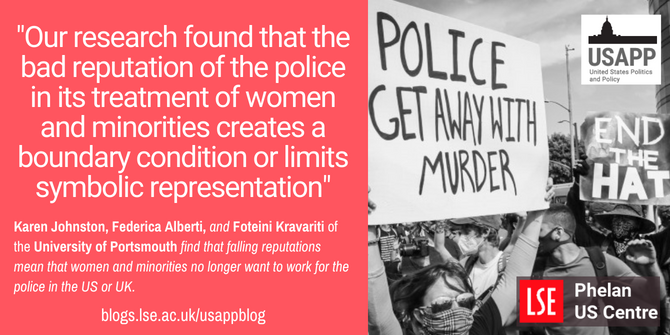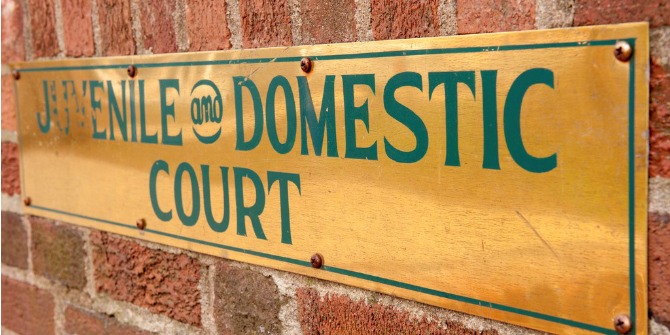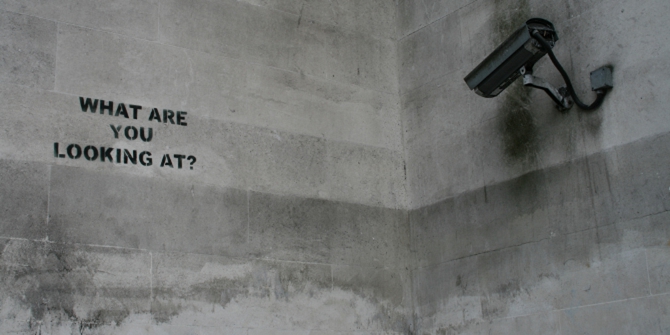

 Following the high profile murders by police of George Floyd in the US and Sarah Everard in the UK, public trust in the police is in crisis. In new research, Karen Johnston, Federica Alberti, and Foteini Kravariti look at the effects of widespread and well-known institutional racism and sexism in police forces on recruitment. Using experimental research, they find that neither the UK nor US police forces are an attractive employment prospect, with reputational prestige scoring the lowest.
Following the high profile murders by police of George Floyd in the US and Sarah Everard in the UK, public trust in the police is in crisis. In new research, Karen Johnston, Federica Alberti, and Foteini Kravariti look at the effects of widespread and well-known institutional racism and sexism in police forces on recruitment. Using experimental research, they find that neither the UK nor US police forces are an attractive employment prospect, with reputational prestige scoring the lowest.
The murders of George Floyd in the US and Sarah Everard in the UK at the hands of serving police officers, and various scandals such as the 48 rape convictions of former police officer David Carrick has brought into sharp focus that policing is facing a crisis. In the UK, just recently His Majesty’s Chief Inspector of Constabulary and Fire & Rescue Services (HMICFRS), Andy Cooke said that “Public trust in the police is hanging by a thread.”
The Problem with Policing
There is now a great deal of evidence of institutional racism and sexism in the police, both in the US and UK. For example, a recent investigation by Independent Office for Police Conduct found that the Metropolitan Police, the police service for the Greater London area and the largest force in the UK, has a culture of racism and misogyny with evidence of harassment (including threats of rape) and exchange of offensive social media messaging. In the US, after the murder of George Floyd, there was a noteworthy decrease in the recruitment of police officers suggesting that the public perceives the police as a discriminatory and thus unattractive employer. The US police now face a historic workforce crisis with an inability to attract and recruit women and minorities to police service. If women and minorities are not attracted to serving in the police, how does this impact efforts to diversify the police workforce?
Despite efforts to increase the recruitment of women and minorities to the police, such as the recruitment drives and outreach programmes in order to increase workforce diversity in the US and the Police Uplift programme in the UK, most police departments in the US and police forces in the UK have been unsuccessful in attracting applicants from diverse backgrounds. For example, in the US, the Police Executive Research Forum found that approximately a third of police departments declare an inability to attract women candidates. In the UK, the Home Office data shows that although the police employed approximately 32 percent of women in 2021, in terms of voluntary resignations 43 percent were by women police officers compared to 29 percent of men. Thus, there is not only a problem of recruitment, but retention as well.
Policing is traditionally viewed as male-dominated with well-embedded patriarchical norms. The perception of the police is one of masculinity, valuing attributes of aggression. Men in the police therefore do not accept the encroachment of women in policing because femininity is seen as being incongruent with policing and attributes of masculinity. Thus, the police as a masculine space are where women (and minorities) are considered as ‘other’ and excluded.
Researching Gender Representation of the Police
Using experimental research design we surveyed the public in the UK and US, to understand if gender representation of the police affects the extent to which women would find the police attractive as an employer. The aim of the research was to understand whether the symbolic effects, if any, of an increased representation of women in a police department would make the police an attractive employment prospect for women.
Our study manipulated the gender composition of the police department in a hypothetical job advert and then asked questions on the extent to which applicants found the police department an attractive employer. The survey was based on an organizational attractiveness scale, which included 5-point scale measures for general attactiveness of an organization (for example “This organization is attractive to me as a place for employment”); reputational prestige (for example “Employees are probably proud to say they work at this organization”); and intention to pursue employment ( for example “I would accept a job offer from this organization”).

Photo by Michael Muthee on Unsplash
The police are not attractive as a potential employer
Overall, respondents to the survey did not find the police to be an attractive employment prospect. In both the US and UK samples, reputational prestige received the lowest score with an average of 2.2 (out of 5) points for the US sample and 2.1 points for the UK sample. General attractiveness and intentions to pursue both received slightly higher scores with an average of 2.6 and 2.7 points respectively for the US sample, and an average of 2.4 and 2.5 respectively for the UK sample. Curiously, women respondents were more attracted to the police department with the higher representation of men. Thus, there were no symbolic effects of gender representation. It is plausible that the social construction of gender and the association of masculinity with policing may offer an explanation with a preference for a male-dominated police department perhaps aligning with societal mores of policing being a male space.
The Vicious Circle
Overall our research found that the bad reputation of the police in its treatment of women and minorities creates a boundary condition or limits symbolic representation. The police will face a crisis in efforts to attract women and minorities to the police. The police in the UK and the US will have to review human resource programmes and recruitment drives to diversify the workforce as these efforts may be bounded by the reputation of the police. Ultimately, a lack of diversity within the police creates a vicious circle.
- This article is based on the paper, ‘Representative bureaucracy and organizational attractiveness: An experimental study of symbolic representation of the US and UK police’ in Public Administration Review.
- Please read our comments policy before commenting.
- Note: This article gives the views of the author, and not the position of USAPP – American Politics and Policy, nor the London School of Economics.
- Shortened URL for this post: https://bit.ly/3XuHD8L






